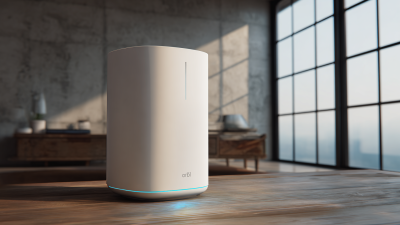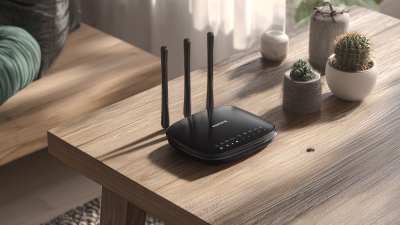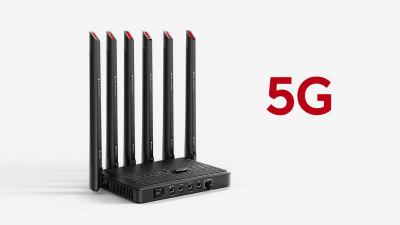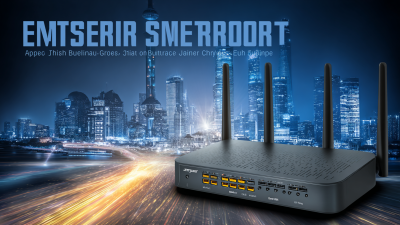In an increasingly connected world, the demand for seamless internet access has reached unprecedented levels. According to a report by Statista, the global number of internet users surpassed 4.9 billion in 2021, and this figure is expected to grow significantly in the coming years. As smart homes and IoT devices become commonplace, traditional routers often struggle to provide consistent coverage and speed. This is where the Mesh Router System comes into play, offering enhanced connectivity with multiple nodes working in harmony to eliminate dead zones and improve network reliability.

Research from the International Data Corporation (IDC) suggests that the mesh networking market is projected to grow at a CAGR of over 20% from 2020 to 2025, underscoring the critical role these systems play in future-proofing our home and work environments. Embracing this technology not only enhances the user experience but also caters to the evolving needs of a digitally driven society.
In recent years, mesh networks have revolutionized home connectivity, establishing a seamless online experience for users around the globe. According to a report by Transparency Market Research, the global mesh Wi-Fi market is set to reach USD 6.9 billion by 2026, with an anticipated CAGR of 32.5%. This surge underscores the growing demand for reliable and expansive internet coverage, especially as more households increase their reliance on multiple smart devices.
When considering a mesh network, it's crucial to assess your home's layout and size. A well-designed mesh system can eliminate dead zones, ensuring that every corner of your home is equipped with strong Wi-Fi signal. Experts recommend placing the primary node in a central location and strategically adding additional nodes to enhance coverage. For optimal performance, look for systems that support the latest Wi-Fi 6 technology, which can handle higher data speeds and a greater number of connections simultaneously.
Tip: To maximize your mesh network’s efficiency, ensure your devices are updated regularly and perform routine speed tests to check for connectivity issues. Additionally, be mindful of interference from physical barriers and other electronic devices; choosing the right frequency band can significantly improve your network’s performance.
As the demand for seamless global internet coverage continues to rise, mesh router systems have emerged as a transformative solution for enhancing connectivity in homes and businesses alike. According to a recent industry report, the global mesh network market is projected to experience significant growth, with an expected increase from $3.6 billion in 2021 to over $12 billion by 2026. This explosive growth underscores the increasing reliance on robust wireless networks that can cover expansive areas without dead zones.

The top mesh router systems of 2025 are designed to tackle diverse connectivity challenges, ensuring users enjoy uninterrupted internet access, regardless of their location. Reports indicate that effective mesh systems not only improve coverage but can also enhance network speeds by over 50% in comparison to traditional routers. Features such as advanced Wi-Fi 7 technology, capable of handling numerous devices simultaneously, are now becoming standard, making these systems indispensable in a digital era where remote work and smart home technology are prevalent. With the right mesh network in place, users can say farewell to connectivity issues and embrace a truly connected lifestyle.
When considering home networking solutions, the debate between mesh routers and traditional routers has gained traction in recent years. Mesh routers utilize multiple interconnected devices to create a seamless wireless network, offering expansive coverage and eliminating dead zones. In contrast, traditional routers typically use a single unit to broadcast a signal, which can struggle to maintain strong connectivity in larger homes or spaces with obstacles. Industry data has shown that mesh systems can significantly outperform traditional setups, particularly in terms of speed and reliability across larger areas.

A comparative analysis reveals that mesh routers excel in their ability to adapt to varying environments. With nodes strategically placed throughout a property, signal strength is less likely to degrade as users move around. This dynamic nature allows families and remote workers alike to experience uninterrupted connectivity, regardless of where they are within their space.
Traditional routers, while often more affordable, may require additional extenders to match the coverage provided by a mesh system, leading to increased complexity and potential for lower overall performance. As technology advances, understanding these differences becomes vital for consumers seeking optimal internet experiences tailored to their unique needs.
When choosing a mesh router system for optimal performance,
there are several key features to consider. First and foremost is coverage area. A good mesh system should provide seamless Wi-Fi coverage throughout your home or office, eliminating dead zones and ensuring strong connectivity in every corner. Look for systems that offer multiple nodes, as this allows you to customize the placement for maximum signal strength.
Another crucial factor is speed. The best mesh routers support the latest Wi-Fi standards, such as Wi-Fi 6, which can handle more devices and provide faster data transmission. This is especially important in environments with high traffic, where multiple devices are streaming, gaming, or working simultaneously. Additionally, consider advanced features like Quality of Service (QoS), which allows you to prioritize bandwidth for specific applications, ensuring smooth performance even under heavy load.
Finally, ease of setup and management should not be overlooked. User-friendly mobile apps can simplify installation and provide useful insights about network performance. Features like automatic updates and device management capabilities can also enhance the overall experience, making it easier to maintain an efficient network. By focusing on these key features, you can select a mesh router system that meets your connectivity needs and enhances your online experience.
Mesh technology has revolutionized the way we experience Wi-Fi in our homes and offices. Unlike traditional routers that cast a single signal, mesh networks consist of multiple nodes that work together to create a seamless blanket of coverage. According to a report by the International Data Corporation (IDC), mesh networking solutions have seen a remarkable growth rate of 33% year-over-year, as users prioritize connectivity and speed in their increasingly digital lives.
One of the key advantages of mesh systems is their ability to eliminate dead zones. A study conducted by Wave7 Research highlights that over 70% of households experience Wi-Fi dead spots due to physical barriers like walls and floors. Mesh routers use strategically placed nodes to extend coverage, allowing devices to maintain stable connections even in larger spaces. In a survey by Revelations Research, 85% of participants reported improved speeds and connectivity in their homes after switching to a mesh system, emphasizing the technology's effectiveness in enhancing user experience.
Furthermore, mesh technology supports advanced features such as band steering and load balancing, optimizing network performance. According to a report from OpenSignal, mesh networks can deliver speeds up to 50% faster than conventional single-router setups. This enhanced speed and connectivity not only cater to the growing demands for streaming and gaming but also set a new standard for home and office environments globally.
| Router Model | Max Wi-Fi Speed | Coverage Area | Number of Nodes | Supported Standards |
|---|---|---|---|---|
| Model A | AC3000 | 5000 sq. ft. | 3 | 802.11ax |
| Model B | AX6000 | 4000 sq. ft. | 2 | 802.11ax |
| Model C | AC2200 | 3500 sq. ft. | 3 | 802.11ac |
| Model D | AX4200 | 6000 sq. ft. | 4 | 802.11ax |








